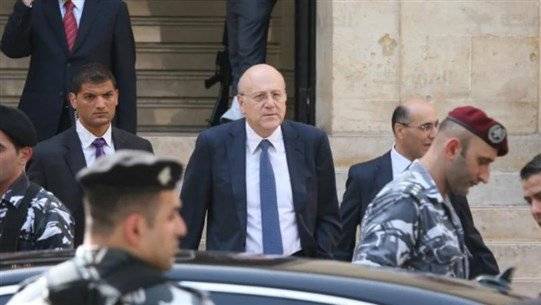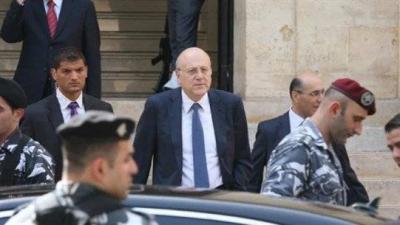The scene could have turned upside down. However, once again, the "Forces of Change" alongside various opposition blocs and deputies fail to translate the slogans they raised on their way to Parliament, opting out for different calculations, abandoning the opportunity to deliver a unified voice. This was demonstrated by the results of the binding parliamentary consultations held yesterday, where the "Democratic Gathering" stood alone with several deputies naming Ambassador Nawaf Salam, while the others refrained, ultimately leading to President Najib Mikati's re-appointment. The number of votes in favor of Mikati reached 54, while 46 deputies abstained from naming anyone, and Nawaf Salam received twenty-five votes.
Political sources spoke to "Anbaa" electronic news about "the discontent of the Sunni street regarding what is happening," and expressed surprise at the reluctance of the two major Christian forces, the Lebanese Forces and the Free Patriotic Movement, to name the designated president as a Sunni position. They considered that "whatever the excuses and reasons, it is illogical to ignore the third position in the hierarchy of the state and to disrespect the head of the executive authority, which is constitutionally one of the most important positions in the republic."
Member of the Armenian bloc, MP Hagop Terzian, described what happened to "Anbaa" electronic news as "regrettable," saying: "Perhaps this occurred due to the fragmentation in the Sunni arena, and it was supposed that matters would not go in this direction — all as a result of what I consider to be selfishness and spitefulness on the part of some. We are in a bad situation due to years of accumulation, and the strong tries to prey on the weak. Sometimes the strength is Maronite, and sometimes Sunni or Shiite; what is happening is no longer a national project," urging everyone to respect the feelings of the people, "for the citizen has his concerns and sorrows, there is a real pain, and it is unacceptable to remain indifferent or rigid concerning our narrow affiliations."
Former MP Assem Araji expressed his astonishment at the reluctance of the deputies of the Strong Lebanon bloc and the Strong Republic bloc to name a Sunni figure for government formation, describing this to "Anbaa" electronic news as "an assault on the charter and national formula," recalling "how President Saad Hariri named President Aoun to the presidency after the Maarab Agreement and the blessing of Bkerke, which cost him dearly." Araji asked, "What would be the position of the current movement if the Sunni deputies boycotted the election of the president? What happened is unacceptable and is a dangerous indicator for the future of Lebanon."
On the other hand, MP Sharbel Maroun from the Strong Lebanon bloc attempted to clarify his bloc's position in a call with "Anbaa" electronic news, pointing out that "the head of the bloc, MP Gibran Bassil, explained the reasons for not specifying the name of the designated president. The experience with President Mikati was not successful in a certain context." He added: "We had agreed on specific matters, and they were not implemented." Regarding granting confidence to the government if formed, Maroun viewed that "it depends on the government's project and the names. If they represent our convictions and aspirations, then why not?"
Additionally, former MP Ali Darwish considered that "it is natural, in light of the changes brought about by the electoral entitlement, for matters to take a different practical turn under the constitutional formula," believing that "it is the right of deputies to choose, and the majority was with President Mikati, who has a clear methodology due to the changes. The situation has changed compared to before the elections, and President Mikati will do his utmost to form a real rescue government, greatly relying on a change in positions after the government is formed and granted confidence, which depends on the government's program."




